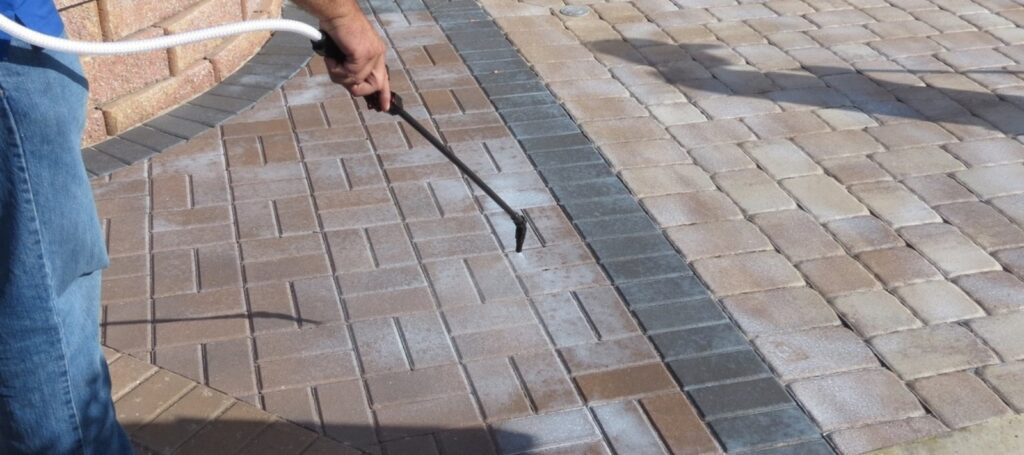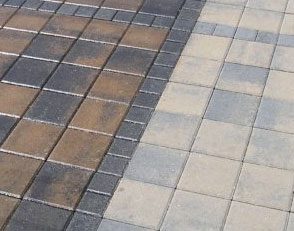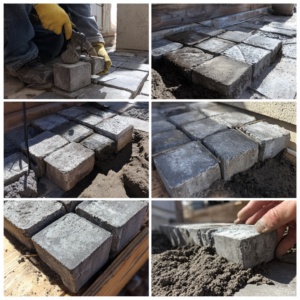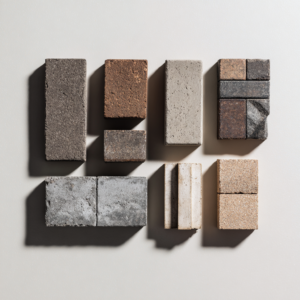So you have finally finished the paver patio of your dreams. Perfectly designed pattern with the exact color you had in mind when first planning it. But now begs the question, should you seal your pavers or not and what are the pros and cons of it?
At first glance, sealing is not that big of a deal, for better or worse, right? Wrong. Sealing or not your patio paver can have huge impacts not only on its aesthetic but also on its functionality.
There are several factors you need to take into consideration before deciding if sealing your pavers is something you want to do. Some of these factors are the purpose of the installation itself, its location, and the material you have chosen for your pavers.
So let’s discuss all these aspects and then talk about the pros and cons involved in sealing your pavers.

Jump to:
Sealing Pavers – Before Making a Decision
Before deciding if you want to seal your pavers, you first have to know if you even can seal them, to begin with.
As a general rule of thumb, sealing is always recommended. It’s one of the safest ways to protect all the time and money you invested in your pavers. It makes maintenance much easier and protects it from many forms of stain, environmental or man-made.
However, not any sealer works for every paver. The first thing you have to consider is if you’re going to use a penetrating sealer or a wet look sealer.
Penetrating sealers are designed to give a protective coat around your pavers without really altering their aesthetic. Wet look sealers, on the other hand, give your pavers that “shiny” finishing touch and can really alter their color and general feel.
In some cases, according to the purpose and material of your installation, you rather not seal your pavers. On a poolside, for example, you want as much adherence as you can to avoid a slippery surface and prevent accidents.
The right stone for your poolside area should be a porous one, designed to absorb humidity without compromising its structure. So, sometimes, the sealer can defeat this very purpose.
That’s why the choice of sealer is so important. We recommend you always check the manufacture for information on the adherence level of the sealer and how much it can change the color of your pavers.
With that out of the way, let’s now discuss all the pros and cons involved in sealing your pavers, starting with the cons.
Sealing Pavers – The Cons
- Investment
For something that is recommended but not exactly required, the investment in the sealing process can be quite expensive for anyone working on a budget.
Be mindful, the investment is worth the money. It will make your life much easier when taking care of your pavers and will protect them very well.
Even so, sealing is not exactly cheap and many people choose to skip it and deal with the possible consequences later, when and if they come. - Contamination of Plants
That might be nothing more than a mild nuisance to some, but for those who care about their lawn and nearby plants, sealing can become quite problematic.
The reason for that is that most sealers are toxic for plants. Actually, for people too, so never forget to wear a mask and protective gear when working with it.
Even if you protect your lawn and plants as best you can, the chances of them getting affected by the sealer are still high. So, if you care deeply about that, maybe sealing is not a good choice. - It Requires Maintenance
Not that you won’t have to maintain your paver otherwise, on the contrary. Either way, you want to take some time to maintain your pavers, sealed or not.
The difference is that the sealer must be applied every year, so that is one more step you will have to take every year to maintain the quality of the sealer. - Appearance Change
Depending on what kind of sealer you choose, the appearance of your pavers might change, and that is simply a big no for many people.
The complicated part is that there’s no way to be sure how a specific sealer will react to your pavers. The safest way is to run some tests with just a little bit of sealer in a small portion of your patio.
Sealing Pavers – The Pros
- Appearance Change
What? Wasn’t that a con just a few lines above?
Yes. Yes, it was. But, for the same reason, it can also be a pro. Something the aesthetical change is welcome, especially if the shiny look is something you’re aiming towards. - Protection
The protection that sealers provide is very important and can really make a difference in the long run. Sealing your pavers protects them against any man-made stains, like food and work accidents.
It also provides much-needed protection against environmental factors, like rain and snow. In extreme weather, the freeze-thaw can really damage your pavers, but sealing them will help in the prevention of that problem. - Drainage and Maitenance
Sealing your pavers can do wonders for the drainage of your patio. With sealers, water has a harder time getting into the cracks and being absorbed by the pavers themselves.
That makes the drainage work a lot better and, with less water on the pavers, you will have fewer weeds and moss growing between the grout lines.
That is also a big bonus when it comes to sealing. Dealing with weeds and moss can sometimes be a real problem and they can really damage the integrity of your pavers.
You Can Always Ask for the Opinion of a Professional

If you’re still unsure about the pros and cons of sealing pavers, you can always look for a professional to help you.
If you happen to be in Florida around the Sarasota area, you’re in luck, because the professionals at JS Brick are always willing to help you with your every hardscape need.
Get in contact right now through the number +1 941 586 9140 for a free estimate.



